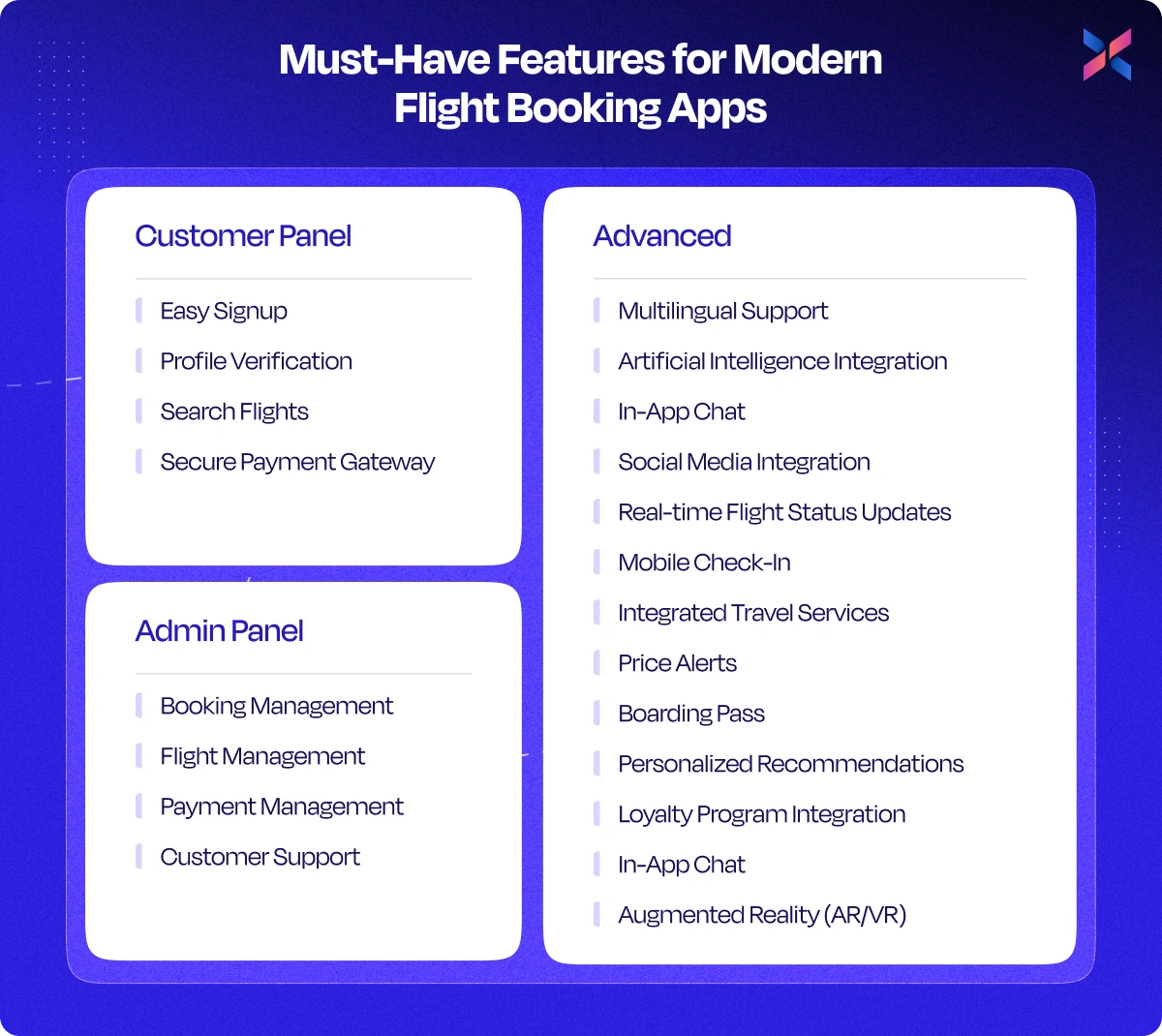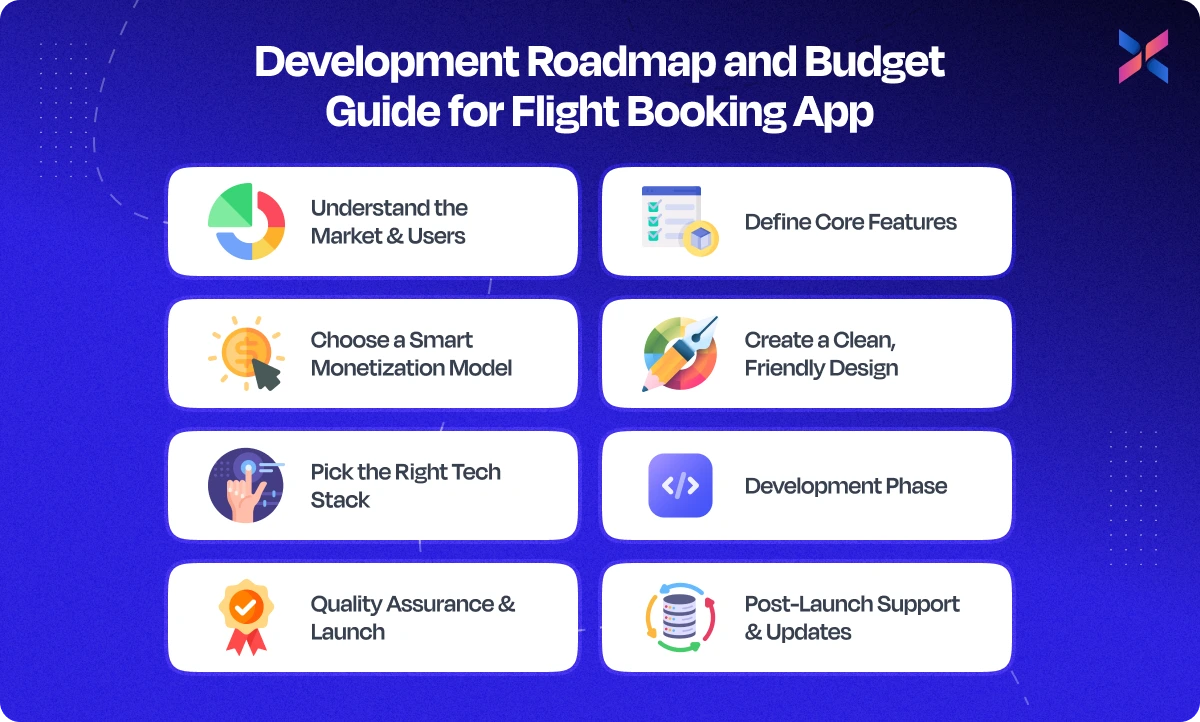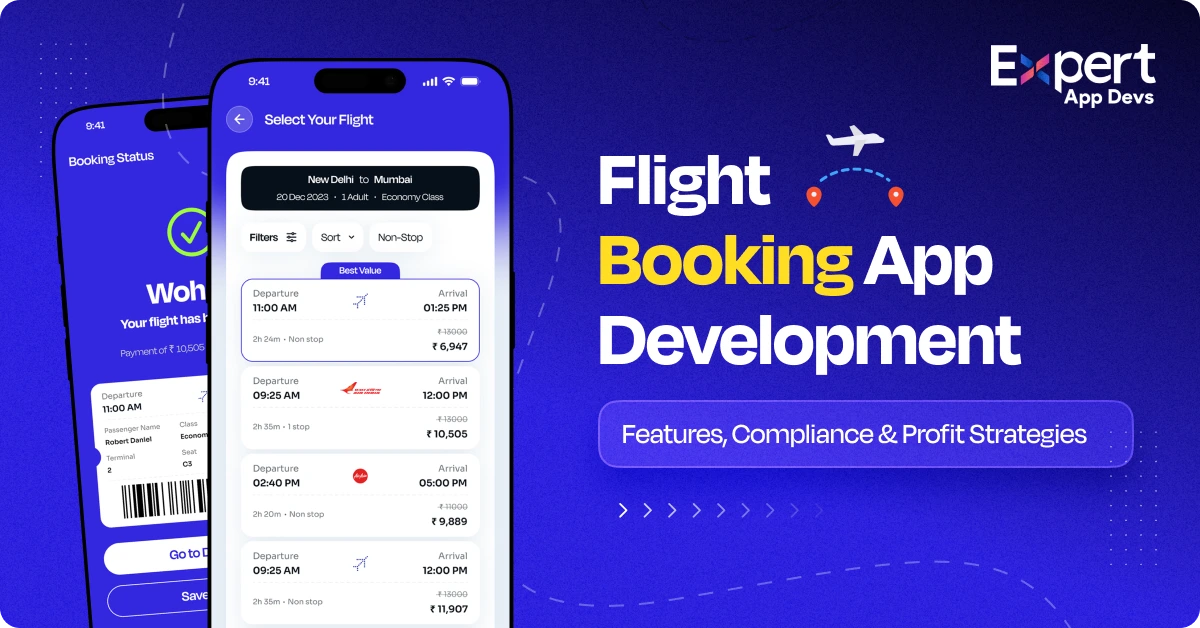How to Develop a Flight Booking App: Features, Compliance & Profit Strategies for the U.S. Market?
Gone are the days when people used to go to a travel agency to book their flight or trip. With evolving technology and lifestyle shifts, convenience and flexibility have become top priorities for travelers. Recent statistics by BusinessofApps show that 850 million people used online travel booking apps in 2023.
Over 68% of user traffic related to travel comes from mobile, which highlights how users value quick, on-the-go access to travel services. Whether it's booking flights, checking prices, or managing itineraries, mobile apps make the process faster and more user-friendly. Desktop usage is declining day by day as the young generation today wants quick booking from a mobile phone.
Though there are a lot of booking apps in the market but to meet the user expectations, regulatory demands, and traveler expectations, choosing Custom flight booking app development is the smart choice.
Travel Market Analysis & User Behavior Insights for Flight Booking Apps
Flight booking app development is evolving with AI, so let's look at some of the useful market statistics and insights related to user behaviour.
- Over 60% of U.S. bookings happen on mobile (Source: TravelPerk), and it’s not just for convenience—it’s about having full control from your pocket.
- Expedia holds a 19.3% share in the US travel market. (source: BusinessOfApps).
- The mobile travel booking market was $228 billion in 2024, and is expected to reach above $526 billion by 2032. (Source: Credence Research)
What do users want most? Instant pricing updates, cancel-at-anytime flexibility, and quick rebooking options when flights change last minute. These features are game-changers. This is where custom flight booking app development stands out. Instead of a universal booking app, developing a custom app that solves real-world problems can help you to grab a market and achieve a good reputation.
Flight Booking App Development: Gaps & Opportunities
The flight booking market is already crowded a lot, as there are so many competitors in the market. It’s important to understand what leading platforms offer—and where they fall short. Let’s take a closer look at three of the biggest names in the industry: Expedia, Hopper, and Skyscanner. These 3 applications are for flight booking but have their own unique functionalities.
- Expedia is an all-in-one travel platform that allows users to book flights, hotels, and rental cars. It is best for general users who want everything in one place.
- Hopper uses AI to predict the best time to book and helps users save money through smart alerts and price tracking.
- Skyscanner is a travel search engine that allows to compare flights, hotels, and car rental providers from multiple sources, giving users the flexibility to compare prices and book according to convenience from external sites.
Look at this table to get an idea of what they offer and what they don't. This helps to get an idea of what you should add in your flight booking app to fulfill the missing pain points of the users.
|
Features |
Expedia |
Hopper |
Skyscanner |
|
All-in-One Booking flight + Hotel) |
Yes |
No |
No |
|
AI-Powered Price Alerts |
No |
Yes |
Yes |
|
Meta Search Capabilities |
No |
Yes |
Yes |
|
In-App Flight Booking |
Yes |
Yes |
No |
|
Focus Audience |
General |
Deal Seekers |
Price Comparers |
So, if you want to develop a flight booking app, you must check what these big players are not offering; this will help you to make your app unique, plus useful too. Many small airlines and travel agencies don't have online visibility but offer satisfactory and reasonable services of flight booking services. It's a good idea to find them as a client for a Custom flight booking app development project.
Must-Have Features for Modern Flight Booking App Development
Before you develop flight booking app, you must research in detail and make a proper list of features and functionalities to make sure the app serves well to the users well. Including features that your competitors don't offer helps you to stand at the forefront.
The Flight booking app features can be divided into three parts- Customer panel, Admin panel and advanced add-ons features.

√ CUSTOMER PANEL FEATURES
#1. Easy Signup
Your app must offer a smooth signup process. It should allow users to log in with email, phone, or social media. This helps users get started instantly without any frustration.
#2. Profile Verification
Include a verification step to ensure secure and trustworthy bookings. It protects both your platform and your users from fraudulent activity.
#3. Search Flights
Make sure users can search for flights using filters like date, destination, or airline. A good search experience helps them find what they need fast.
#4. Secure Payment Gateway
Use trusted payment providers to offer safe transactions. This builds confidence and ensures users complete their bookings without second thoughts.
√ ADMIN PANEL FEATURES
#5. Booking Management
Admin should be able to track and manage all bookings easily. This helps to easily handle user bookings, queries, cancellations, and refunds.
#6. Flight Management
Admins should be able to add, edit, or remove flight details quickly. This will keep your app’s listings accurate and up-to-date.
#7. Payment Management
Admins can control and monitor all financial activity, like commissions, refunds, etc.
#8. Customer Support
Always include a support system where users can get timely help. A responsive support team can turn problems into positive experiences.
Features you add to the app can either make or break the user experience.
√ ADVANCED FEATURES
#9. Multilingual Support
If you want to reach a global audience, your app must support multiple languages so users can use and understand the app in their language.
#10. Artificial Intelligence Integration
Use AI to offer a personalized experience to users. AI in flight booking apps helps to suggest flights, predict fare drops, and send alerts.
#11. In-App Chat
Add real-time chat so users can get help instantly. Whether it’s a booking issue or a quick question, this feature boosts satisfaction.
#12. Social Media Integration
Add social media integration in your app so users can log in through social media, share trips with their friends. It’s a small convenience that adds big value and free marketing for your app.
#13. Real-time Flight Status Updates
Keep travelers informed by sending instant updates on flight delays, gate changes, cancellations, or baggage info. This helps users stay stress-free and adjust their plans quickly without constantly checking the airport boards.
#14. Mobile Check-In
Allow users to check in through the app to skip long airport lines. They can choose seats, confirm their presence, and get their boarding pass.
#15. Integrated Travel Services
You can also add hotel bookings, car rentals, and travel insurance options right in the app. These extra options help users to access everything from one app without visiting different apps.
#16. Price Alerts
Allow users to set alerts for their next booking so they can check whenever prices drop or rise, the app notifies them so they can book at the best time and save money without searching effort.
#17. Boarding Pass
Generate digital boarding passes within the app so users can save and use them right from their phones. No printing needed—just scan and go to the airport!
#18. Personalized Recommendations
Use travel history and preferences to suggest flights, destinations, and deals tailored to the user’s interests.
#19. Loyalty Program Integration
Provide your regular or first-time users with loyalty rewards or gift cards.
#20. In-App Chat
This allows users to ask questions, get booking help, or resolve issues instantly without waiting or emailing.
#21. Augmented Reality (AR/VR)
Allows users to explore airport layouts or take virtual tours of hotel rooms. This can give the user an idea about the environment and ambience.
Core Tech Stack Needed To Develop A Flight Booking App
Before starting the flight booking app development, decide on the technology stack you want to use for front-end, back-end, UI/UX design, API integrations, AI/ML, payment integrations, and more. The three below are essential as they perform the basic operations.
#1. API Integration
API is important in the travel industry. Amadeus, Sabre, and Google Flights are some of the popular APIs that most booking and travel websites use to show real-time flight listings and prices. Amadeus and Sabre give access to global flight inventories, seat availability, and airline schedules. Google Flights API is great for pricing insights and search functionality. These integrations help your app to pull live data from airline systems so users can book confidently.
#2. AI & Machine Learning
AI is everywhere, and we have to accept it- smart features are not possible without AI anymore. You should integrate AI/ML in the flight booking app because they can predict the best time to book tickets, send alerts about possible delays, and create dynamic travel packages personalized for users (like hotel + flight deals). Eventually, users will have a better experience with this when they get the best deals, discounts, and a customized experience.
#3. Payments
For safe and smooth transactions, use trusted gateways like Stripe or Braintree. These platforms are secure and follow PCI-DSS standards, which means user payment info is protected. They also support multiple currencies and payment methods, great for users booking from different countries.
This way, you can get traffic from global customers.
Travel App Development Cost & Timeline
The cost to develop any travel app can vary from $15,000 to $250,000, depending on the features, complexity, platform used, UI/UX design, maintenance, and other things. Usually, the basic travel app can be completed within 3 months, while more complex apps can take up to 12 months or even more.
Here is a comprehensive checklist that you need to follow to plan the development roadmap and accurately estimate the budget to build a successful flight booking app.

#1. Understand the Market & Users
Do a detailed market research about the flight booking app market. Study your competitors—what are apps like Skyscanner, Expedia, or Google Flights doing right? Where do users feel frustrated? Identify what your audience actually wants, whether it's budget travelers seeking deals or business travelers who want flexibility.
#2. Define Core Features
Once you’ve understood your users, shape your app with must-have features: real-time flight search, booking, payments, e-tickets, trip management, customer support, and user accounts. Add-ons like price alerts, loyalty programs, and in-app chat can give you a unique edge.
#3. Choose a Smart Monetization Model
Make sure your app doesn’t just work—it earns. There are three main ways to monetize a flight booking app.
✅Commission model
In the commission model, you get a commission on each booking that is done from your app. The flight booking apps in the market usually charge 5–15% commission on each booking. You can also earn the nominal commission.
✅Subscription-based model
Subscription-based models work by offering premium features to users, like pricing for early access or discounts, priority reservations, exclusive deals, etc.
✅Advertisements
In this model, airlines, hotels, travel booking, and other businesses need to show ads of your app to the relevant target audience who are planning to travel and require flights.
Case Study: How Hopper Monetizes Cancellations?
The popular travel app Hopper uses cancellations as a revenue opportunity. It offers options such as Cancel for Any Reason and Change for Any Reason that give customers the option to change or cancel their bookings for an additional fee. These safeguards operate rather like micro-insurance, earning money before the user ever actually avails of their insurance.
What’s more, Hopper provides a price-freezing feature, which allows users to lock in fares for some time. And if the user cancels or doesn’t complete the booking, Hopper frequently keeps part of the freeze fee, effectively turning the user’s cancellation into profit.
Hopper takes a commission on each travel booking flight, hotel made on its platform. Though cancellations may result in fewer completed bookings, the revenue from cancellation protections and ancillary services compensates for some of the potential losses.
#4. Create a Clean, Friendly Design
Start with wireframes and prototypes. Keep the design intuitive—users should find flights, compare prices, and book with just a few taps. Use appealing visuals, readable fonts, and clear buttons. Prioritize accessibility for everyone and make your app multilingual to reach a global audience.
#5. Pick the Right Tech Stack
Your app’s performance depends heavily on what technology you use. Use Native: Swift if making an app for an iOS audience, and Kotlin if targeting Android users. But as all iOS and Android users will be booking the flight, choosing Flutter or React Native is a good idea to target a wider audience.
#6. Development Phase
Once you have chosen the technology stack, finalized features, and other things, start developing. Hire an experienced app developer or a mobile app development company to save time, cost and ensure performance accuracy.
Pro tip: Break the project into sprints: start with MVP (Minimal Viable Product), then scale.
MVP can cost you around $80-$150 K, while a full-scale enterprise version can range up to $ 250 K+ or even more, depending on the complexity.
#7. Quality Assurance & Launch
A flight booking app must operate well as people will be using to book flights for important meetings and travel plans.
Before going live:
- Run unit, integration, user acceptance, and performance tests.
- Check responsiveness on all devices and OS versions.
- Fix bugs, polish user flows, and ensure everything runs smoothly.
#8. Post-Launch Support & Updates
Every app needs improvement and upgrades over time. Monitor app usage, gather user feedback through in-app forms or surveys, and use tools like Google Analytics to track behaviors. Regular updates are essential, technology evolves fast, and so do user expectations. Keep enhancing UX, performance, and security over time.
Compliance & Security Tips for Flight Booking App Development
When building a flight booking app, it's essential to follow the rules — not just to stay legal, but to protect your users and your business.
#1. DOT Regulations
If you're serving U.S. travelers, your app must clearly show the full cost of flights, including all taxes and fees, right from the start. Hiding extra charges until checkout can put you in trouble.
#2. Data Privacy
For booking purposes, you’ll likely collect personal details like names, emails, and passport info. To stay safe and trustworthy, follow data privacy laws like GDPR (for Europe) or CCPA (for California). This means being clear about what data you collect and giving users control over it.
#3. Fraud Prevention
Add layers of security to protect payments and user accounts. This includes features like 3D Secure for credit card transactions and biometric login (like Face ID or fingerprint) to keep accounts safe.
Flight Booking App UX/UI Best Practices for Higher Conversions
The purpose of your app is to convert users and retain them, and keep them using your app. So here are some of the UI/UX practices to get higher conversions.
#1. Mobile-First Design
Most travelers book flights on their phones, so design your app to be mobile-friendly and responsive to different screens. What you can do is:
- Use large, thumb-friendly buttons that are easy to tap.
- Include features like dark mode to reduce eye strain during late-night browsing.
#2. Booking Funnel Optimization
Keep the steps simple and limited to 3–4 screens max. Ask only for the essential information needed to complete a booking. This focused flow keeps the user engaged, shortens decision-making time, and increases the chances of a successful booking.
#3. Performance Optimization
Speed is everything. Make sure your app loads within 2-3 seconds. Follow Google’s Core Web Vitals to keep your app performing fast and stable.
Conclusion
Building a flight booking app isn't just about developing features — it’s about providing a frictionless, secure, and scalable experience for today's travellers. In this article, we have covered market research, must-have features, legal compliance, UX best practices, and important things. With the right team and approach, your app can get the attention it deserves in a cluttered marketplace.
In a world of delayed flights and confusing apps, we can develop app solutions that are easy to use and hassle-free.
If you need a compliant, high-converting flight booking app? Schedule a free consultation call with Expert App Devs to learn how we can help you.
 Jignen Pandya
Jignen Pandya




